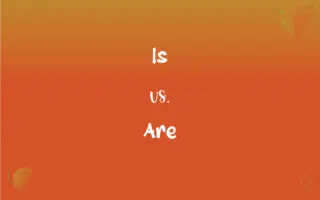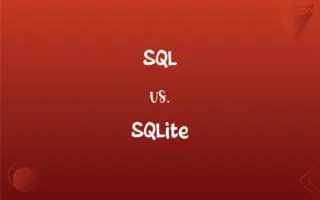Episcopalian vs. Catholic: What's the Difference?
Edited by Aimie Carlson || By Harlon Moss || Published on February 28, 2024
Episcopalians are part of the Anglican Communion with more liberal practices; Catholics are under the Roman Catholic Church, adhering to traditional doctrines and papal authority.

Key Differences
Episcopalians and Catholics are both Christian denominations with roots in the early Church. However, Episcopalianism, part of the Anglican Communion, emerged from the Church of England, whereas Catholicism is centered around the Roman Catholic Church. This difference in origin has led to varying practices and beliefs.
In terms of governance, the Episcopalian Church does not recognize the authority of the Pope, which is a fundamental aspect of Catholicism. Instead, Episcopalians have bishops and the Archbishop of Canterbury as a spiritual leader, but not as a supreme authority. Catholics, on the other hand, view the Pope as the successor of Saint Peter, giving him ultimate authority over Church matters.
Episcopalians are known for their relatively liberal stance on various issues, including the ordination of women and LGBTQ+ rights. The Catholic Church, in contrast, maintains traditional views, upholding conservative positions on these issues and not allowing the ordination of women as priests.
Liturgically, both Episcopalians and Catholics have similar rituals and sacraments. However, Episcopalian services may vary in formality and can be more adaptable to modern contexts. Catholic masses follow a more standardized and traditional format, emphasizing rituals passed down through centuries.
Episcopalians and Catholics both emphasize the importance of the sacraments and the teachings of Jesus Christ. However, their interpretations and practices regarding these elements can differ significantly, reflecting their distinct theological and historical paths.
ADVERTISEMENT
Comparison Chart
Authority
No papal authority, led by bishops.
Papal authority, led by the Pope.
Origins
Rooted in the Church of England.
Centered around the Roman Catholic Church.
Stance on Social Issues
Generally liberal, including ordination of women and LGBTQ+ rights.
Generally conservative, traditional views on ordination and LGBTQ+ issues.
Liturgical Practices
Varied, adaptable to modern contexts.
Standardized, traditional format.
Theological Approach
More open to interpretation and change.
Adheres to established doctrines and traditions.
ADVERTISEMENT
Episcopalian and Catholic Definitions
Episcopalian
A member of the Episcopal Church, part of the Anglican Communion.
She is an Episcopalian and attends the local Episcopal church.
Catholic
An adherent of a Christian denomination under papal authority.
As a Catholic, he respects the Pope's teachings.
Episcopalian
A follower of the Christian denomination known for its relative liberalism.
As an Episcopalian, he supports the ordination of women.
Catholic
A member of the Roman Catholic Church.
She is a devout Catholic and attends mass every Sunday.
Episcopalian
An adherent to a form of Christianity with a blend of traditional and progressive elements.
Episcopalians often engage in discussions about modernizing church practices.
Catholic
Characterized by traditional Christian practices and beliefs.
Catholic schools often emphasize religious education.
Episcopalian
Pertaining to the Episcopal Church.
The Episcopalian liturgy is similar to the Catholic mass, but with some differences.
Catholic
A follower of a worldwide Christian church with established doctrines.
Catholics around the world celebrate Easter and Christmas with special reverence.
Episcopalian
Characterized by governance through bishops.
Episcopalian church governance does not recognize the Pope's authority.
Catholic
Relating to the Roman Catholic Church.
The Catholic doctrine has a rich history and tradition.
Episcopalian
Of, relating to, or belonging to the Episcopal Church.
Catholic
Of broad or liberal scope; comprehensive
"The 100-odd pages of formulas and constants are surely the most catholic to be found" (Scientific American).
FAQs
What defines an Episcopalian?
An Episcopalian is a member of the Episcopal Church, part of the Anglican Communion.
Who leads the Episcopalian Church?
The Episcopalian Church is led by bishops; the Archbishop of Canterbury is a spiritual leader but not a supreme authority.
What are Episcopalian views on social issues?
Episcopalians generally hold liberal views, including supporting LGBTQ+ rights and the ordination of women.
How do Episcopalian and Catholic liturgies compare?
Both have similar rituals, but Episcopalian services are more varied and adaptable.
What defines a Catholic?
A Catholic is a member of the Roman Catholic Church, which is under the authority of the Pope.
Are Catholic services uniform worldwide?
Yes, Catholic masses follow a standardized format globally.
Do Catholics and Episcopalians share similar beliefs?
Yes, they share core Christian beliefs but differ in interpretations and practices.
What is the Catholic Church’s stance on social issues?
The Catholic Church maintains traditional, conservative views on issues like women's ordination and LGBTQ+ rights.
Can women become priests in the Episcopalian Church?
Yes, the Episcopalian Church ordains women as priests.
Do Episcopalians recognize the Pope?
No, Episcopalians do not recognize the authority of the Pope.
What is the Catholic view on same-sex marriage?
The Catholic Church does not recognize same-sex marriages.
How do Episcopalians interpret the Bible?
Episcopalians often interpret the Bible with a mix of tradition and modern understanding.
How do Catholics interpret the Bible?
Catholics interpret the Bible through the lens of established church teachings and traditions.
What is the significance of the Pope in Catholicism?
The Pope is the supreme leader of the Roman Catholic Church and is considered the successor of Saint Peter.
Does the Catholic Church ordain women?
No, the Catholic Church does not allow the ordination of women as priests.
What is the Episcopal Church’s view on same-sex marriage?
The Episcopal Church generally supports same-sex marriage.
Is divorce accepted in the Episcopalian Church?
Yes, the Episcopalian Church allows and accepts divorce.
Do Episcopalians pray to saints?
Episcopalians may honor saints but do not emphasize intercession as in Catholicism.
Do Catholics pray to saints?
Yes, Catholics often pray to saints for intercession and guidance.
Is divorce accepted in the Catholic Church?
The Catholic Church does not recognize divorce; annulments are the alternative.
About Author
Written by
Harlon MossHarlon is a seasoned quality moderator and accomplished content writer for Difference Wiki. An alumnus of the prestigious University of California, he earned his degree in Computer Science. Leveraging his academic background, Harlon brings a meticulous and informed perspective to his work, ensuring content accuracy and excellence.
Edited by
Aimie CarlsonAimie Carlson, holding a master's degree in English literature, is a fervent English language enthusiast. She lends her writing talents to Difference Wiki, a prominent website that specializes in comparisons, offering readers insightful analyses that both captivate and inform.






































































